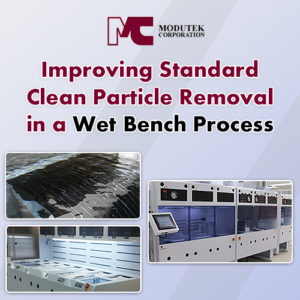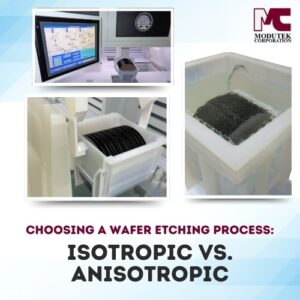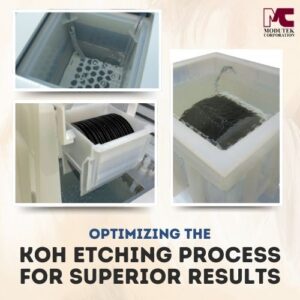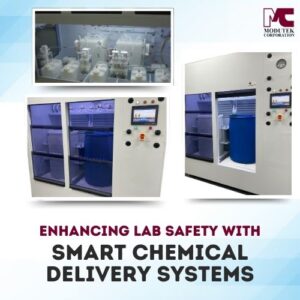 When silicon wafer yields are not improved with the Standard Clean process, improved particle removal can be achieved with advanced processing equipment. Standard Clean or RCA clean was developed by the RCA company in 1965 and it has changed little since then. It has always been successful in cleaning wafers and removing most particles. However, with silicon circuits and structures decreasing in size and product density on wafers increasing, even the tiniest particles can cause device defects.
When silicon wafer yields are not improved with the Standard Clean process, improved particle removal can be achieved with advanced processing equipment. Standard Clean or RCA clean was developed by the RCA company in 1965 and it has changed little since then. It has always been successful in cleaning wafers and removing most particles. However, with silicon circuits and structures decreasing in size and product density on wafers increasing, even the tiniest particles can cause device defects.
RCA clean works by first dissolving and removing organic materials from the surface of the wafers using powerful chemicals. In a second step, metallic impurities are removed and the wafer is rinsed clean. The two-step process and the rinsing remove most particles but the smallest particles often remain attached to the wafer with surface tension and electrostatic charges. Such particles can affect diffusion in wafers or block the etching of electronic structures or circuit paths.
The submicron particles are hard to remove completely with chemicals or by rinsing. The use of megasonic cleaning technology to generate very high-frequency sound waves in the wafer bath provides the capability to dislodge all remaining particles, allowing them to be rinsed away. Megasonic cleaning improves Standard Clean particle removal process and helps ensure defect-free production of microscopic structures on the silicon wafer.
How Megasonic Cleaning Works to Improve Standard Clean Particle Removal
The two steps making up the RCA wafer cleaning process are SC1, using a mixture of ammonium hydroxide and hydrogen peroxide, and SC2, using a mixture of hydrochloric acid and hydrogen peroxide. The SC1 process removes most of the contamination from the silicon wafer surface, but introduces metallic ion contaminants that can influence subsequent wafer processing steps. The SC2 process dissolves the remaining contaminants, allowing impurities to be rinsed away as they float to the surface of the cleaning mixture.
Standard Clean takes place in heated inert tanks such as quartz baths that are carefully designed to limit additional contamination. The chemical mixtures are heated to about 80 degrees centigrade and processing takes about 10 minutes for each step. After rinsing, the silicon wafers are clean but may still have an unacceptable number of submicron particles adhering to the wafer surfaces.
Megasonic cleaning can remove the majority of these particles while also dislodging the few larger particles that may still be present. The process involves adding a megasonic transducer to the tank holding the wafers. The transducer converts very high-frequency signals from a megasonic generator into sound waves that travel through the rinsing water to strike the wafer surfaces. Sound wave frequencies are typically at or above 1 MHz but may range as low as 200 kHz depending on the specific cleaning application.
As the sound waves travel through water, they create microscopic cavitation bubbles that form and burst in tune with the sound wave frequency. When the bubbles burst, they produce tiny but intense jets of water. The jets from the bubbles near the wafer surfaces dislodge any remaining particles, leaving them to be rinsed away at the surface of the bath, for example via an overflow weir. The additional Megasonic Cleaning step is very effective in particle removal because the tiny jets break any bonds that make the particles adhere to the wafer. The result is extremely low particle counts on wafers that undergo both the RCA wafer cleaning process and Megasonic Cleaning.
Modutek Designs and Builds Specialized Equipment to Improve Wet Bench Processes
Megasonic Cleaning is one example of Modutek’s implementation of designs and technologies that improve wet process performance for their customers. For over forty years Modutek has been providing specialized semiconductor manufacturing equipment to meet unique industry needs. As a leading semiconductor equipment manufacturer, the company offers free consulting and can provide recommendations on equipment from its complete product lines. When Modutek supplies wet bench equipment to customers, the company follows a well-defined process to ensure their equipment performance meets customer requirements.




